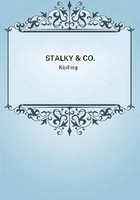Congress adjourned on June 16th and Douglas, after spending a few days in New York, returned to Chicago. Meanwhile the people of Illinois had awakened to great political activity. On April 21st the regular Democratic Convention was held at Springfield and without opposition passed a resolution endorsing his candidacy for re-election. On June 9th the "Administration Democracy," consisting of the Federal office holders and those democrats who condemned his anti-Lecompton battle, held a Convention at Springfield, the purpose of which was to divide the party and insure his defeat. On the 17th the Republicans held their Convention at Springfield and chose Lincoln as their candidate for United States Senator.
The nomination of Lincoln was not an accident. He was prepared to accept it in a speech that should serve as the text of his campaign and was destined to great fame in after years. Against the resolve of his friends he announced the dangerous doctrine that the Government could not endure permanently half slave and half free. "A house divided against itself cannot stand." He did not expect the Union to be dissolved or the house to fall, but that it would cease to be divided. "Either the opponents of slavery will arrest the further spread of it, and place it where the public mind shall rest in the belief that it is in the course of ultimate extinction, or its advocates will push it forward till it shall become alike lawful in all the States, old as well as new, North as well as South."The repeal of the Missouri Compromise and the establishment of squatter sovereignty was a great step towards the nationalization of slavery. This was followed by the Dred Scott decision forbidding Congress to interfere with it in the Territories. All the legislation of Congress had carefully reserved a place for this expected decision. Douglas had hinted it in the Senate long before it was announced. Pierce and Buchanan had proclaimed it before the Judges. "We cannot absolutely know that all these exact adaptations are the result of preconcert. But when we see a lot of framed timbers, different portions of which we know have been gotten out at different times and different place, and by different workmen,--Stephen, Franklin, Roger and James, for instance,--and when we see these timbers all joined together and see they exactly make the frame of a house or mill, all the tenons and mortises exactly fitting, * * * * * we find it impossible not to believe that Stephen and Franklin and Roger and James all understood one another from the beginning and all worked upon a common plan or draft drawn up before the first blow was struck."He repelled the suggestion made in some quarters that the Republicans ought to cease their fight on Douglas and rally to his support in his contest with the slavery propagandists. He reminded them that the very essence of Republican faith was hostility to slavery, while Douglas frankly declared that he did not care whether it was voted up or voted down. The cause must be entrusted to those whose hearts were in the work and who did care for the result.
On the 9th of July Douglas returned to Chicago and received a royal welcome. A special train loaded with prominent citizens was dispatched to meet him. On his arrival he was greeted with tumultuous applause. He addressed the vast multitude from the balcony of the Tremont House. Thirty thousand people are said to have gathered to hear him. He was profoundly pleased by this splendid ovation so strikingly in contrast with the reception four years before, when his neighbors refused even to hear him in defense of his course. Among the distinguished visitors on the speakers' stand sat Lincoln.
After thanking his audience for the enthusiastic reception, he plunged into the subject then uppermost in the public mind by rehearsing his relation to the whole Kansas problem. He reminded them of his early and consistent devotion to popular sovereignty, which had been so utterly outraged by the Lecompton Constitution. He assured his hearers, however, that his opposition to that Constitution arose from no sentimental morality and bore no relation to the ethics of slavery. He insisted, not that it be good or just, but that it be submitted to a vote of the settlers.
He then addressed himself to Lincoln's Springfield speech. He attacked his extreme doctrines with characteristic adroitness.
Lincoln's speech was of doubtful prudence as a campaign argument.
It really foreboded civil war or a peaceful dissolution of the Union. While this alternative was, perhaps, inevitable, political expediency forbade its avowal. Douglas declared the necessary result of his philosophy to be a war of sections, a war of the North against the South, of the free States against the slave States, to be continued relentlessly until the one or the other should be subdued and all should either become free States or all become slave States. But this was not the true theory of the American Union. The States differed widely in soil, climate, resources, tastes and habits. Their laws and institutions were utterly unlike.
New Hampshire's laws were unfit for South Carolina; those of New York were not suited to the Pacific Coast. Uniformity in local and domestic affairs would be destructive of State rights, State sovereignty and personal liberty. Uniformity was the parent of despotism the world over. The only way of attaining Lincoln's proposed uniformity would be to abolish State legislatures, blot out State sovereignty and merge the States into one consolidated empire. But diversity, dissimilarity, variety in all their local and domestic institutions was the great safeguard of their liberties.
He insisted on reverently bowing to the Supreme Court as the authoritative expounder of the Constitution, rather than appealing from it to a tumultuous town meeting where constitutional questions arose. The Federal Government was founded on the white basis.















